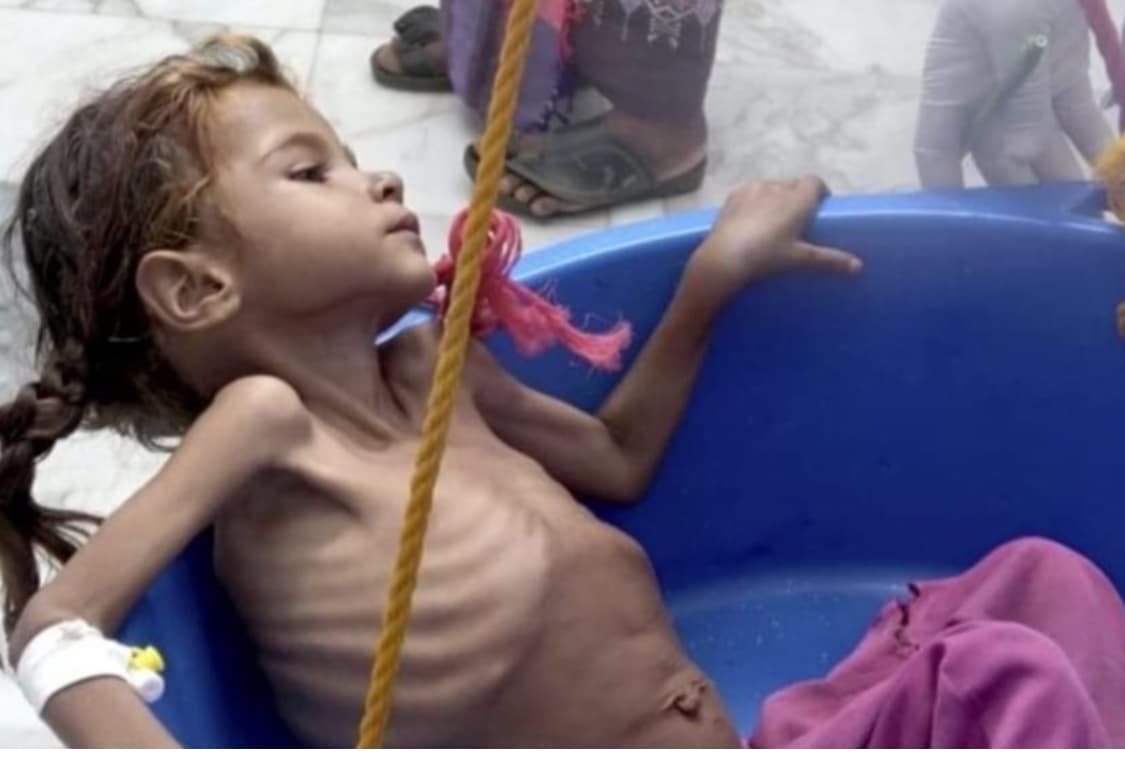Her name is Salwa. She is five years old and weighs just three-and-a-half kilograms.
In the middle of the world’s worst humanitarian disaster, now hit by coronavirus and a crisis of funding too, this is what childhood looks like.
Salwa with her parents and siblings live in the mud hut that is the family’s third home in her short life.
“My daughter suffers from severe malnutrition,” her father tells us. “She is five years old and was always like this.
“Now she is in a bad condition and our situation is much worse because of the war and coronavirus. We are trapped in our houses and we cannot afford 100 Yemeni Rials (less than 20p) for food for one day.
“We were displaced to Al Jar because of the war. We worked in Al Jar for one year. Then it was bombed. We moved to Al Asakarah. But we had no livestock or job. [Now] we are 10 kilometres from a military area. We are displaced and we can’t work.”
Five years of civil war, fuelled by regional and global powers on both sides, combined with the impact of multiple diseases and now a cut in foreign aid too, have left Yemen in a situation incomparable to any other country globally.
Speaking to Sky News, the United Nations under secretary-general for humanitarian affairs, Sir Mark Lowcock, said the situation was beyond critical.
“I have worked on Yemen for many years now, seeing many bad moments. This is the darkest moment I have ever seen,” Sir Mark said.
“The world has a simple, straightforward choice. You can either resume funding of the Yemeni operation and save millions of lives or watch as the country simply falls of the cliff.”
As Sky News reported last month, the UN has already warned of the closure of a number of its programmes because donor nations, hit by their own economic crises, are cutting funding.
Confirming the impact of these cuts, Sir Mark said: “We raised lots of money for it last year. More than $3bn (£2.4bn), and that enabled us to feed 13 million people a month. Now the money has fallen away.”
The numbers, collated by the UN Children’s Agency (UNICEF), are overwhelming.
Four in five Yemeni children, 12.3 million, are in desperate need of aid. More than 1.7 million children have been forced to flee their homes to camps, which are themselves now at threat of closure because of a cut in funding.
Some 10.2 million children do not have access to basic healthcare. And over the course of the civil war, drug-preventable diseases like diphtheria, cholera, measles and malaria – are all rife.
Malnourishment is the most visually arresting aspect of this crisis. Two million children under the age of five are believed to be malnourished. Of them, about 325,000 have severe, acute malnutrition.
The longer-term consequence for children like Salwa, if they survive, is stunted growth and irreparable damage to the cognitive development.
Nearly half of children in Yemen are stunted, indicating the level of malnutrition across the country.
According to Sir Mark, the number of people the UN agencies and their partners are able to feed has dropped from 13 million to eight million.
He said: “Famines are often caused not by an absolute shortage of food but because millions of people simply don’t have an income or any source of money to buy the food, and that’s why the UN with other NGOs like the Red Cross have been feeding 13 million people has been so important.
“But we can only do that to the extent that we have the money. If we don’t have the money, those people are destitute. They have no income. And so there can be food in the market, but you don’t get to eat and your children starve,” he said.
Disruption in global supply chains as a consequence of the global pandemic mean that vital vaccination programmes are impacted.
Programmes already under way have been hit because of the movement of health workers within the country and because 160 UN staff and their dependants have themselves contracted COVID-19 and are self-isolating.
The London School of Hygiene and Tropical Medicine estimates that as many as a million people in Yemen may have been infected with the coronavirus.
The Johns Hopkins Bloomberg School of Public Health has estimated that an additional 6,600 children under the age of five could die over the next six months from preventable conditions like diarrhoea, malnutrition and respiratory tract infections.
The Yemeni conflict, which began in 2014, saw the Houthi movement oust the country’s government and take control of major cities including the capital Sanaa.
Yemen’s government has been exile since 2015 when Saudi Arabia, along with the UAE and others, began a military campaign aimed at defeating the Houthis, who they accuse of receiving financial and military support from Iran.
The escalation of regional rivalries coupled with an internal civil war essentially divided the country – different areas controlled by different factions – and it has led to the catastrophic humanitarian crisis.
Western powers – including the UK and the US – have backed the Saudi-led coalition in a devastating military campaign which has killed thousands of civilians in the fighting and many more because of the deteriorating conditions on the ground.
“Of course the real solution to the tragic problems we see now in Yemen is peace. The men with guns and bombs need to put the guns and bombs down and get round table and move forward in a peace process,” Sir Mark said.
“It’s a stark choice. Your footage and other pictures of what’s happening means the world can watch what’s happening in Yemen. There is no secret about what’s happening there.
“The world needs to wake up and decide whether it’s willing to let millions of children simply lose their lives or whether it is to step up, and, as is still possible, prevent a huge tragedy.”












